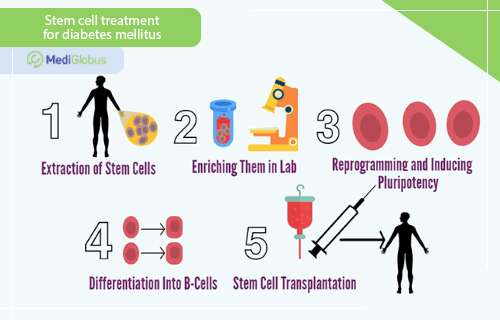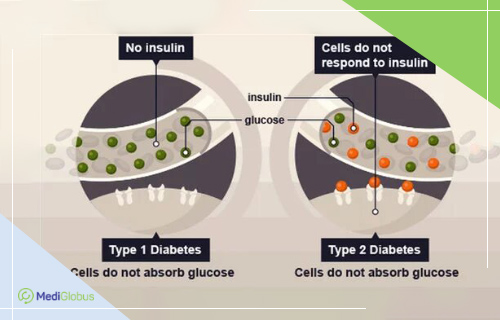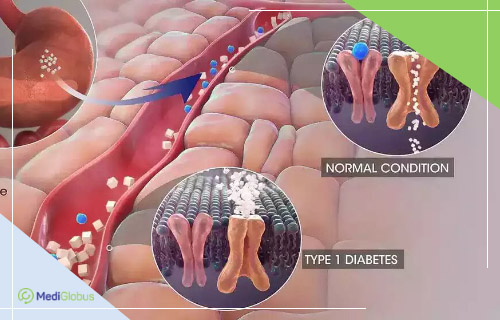According to the latest data from the International Diabetes Federation, diabetes mellitus affects about 537 million people in the world. Unlike many other diseases, the prevalence of diabetes is only increasing every year. To maintain health, people with diabetes need to follow a strict lifestyle and take regular medication. Without proper care, the consequences can be severe – blindness, kidney failure, heart attacks, strokes and amputations.
However, few people are aware of a new treatment for diabetes – stem cells. Although the therapy has been developed only recently, it has proved to be an effective and safe means of fighting the disease. Read our article to learn about the perspectives of this new treatment and where it is provided.
How is cell therapy used in diabetes mellitus?
Stem cells can help people with diabetes to get rid of severe symptoms of the disease, as they assist the body in producing insulin on its own.
Beta cells in the pancreas are responsible for regulating insulin levels in the blood, which generates energy from food. However, in diabetes, these cells do not function fully, which leads to impaired insulin production. As a result, there are problems with glucose processing and blood sugar levels rise.
Stem cells cannot completely cure diabetes. However, they can significantly alleviate the symptoms of the, reduce the necessary dosage of medication and eliminate the need for relentless monitoring of sugar levels.

Without the normal-functioning pancreas, glucose accumulates in the body, potentially causing damage to internal organs. The standard treatment plan for diabetes mellitus is a diet low in sugar, insulin injections or taking sugar-lowering medications. However, this solution requires constant monitoring of sugar levels, as well as following strict rules. Sometimes, even with proper treatment, diabetes progresses.
Stem cells can partially restore normal pancreatic function in diabetes. They replace non-functioning beta cells and begin to produce insulin. This restores the balance of glucose in the blood and reduces the frequency of insulin injections.
For stem cell therapy, doctors can use cord blood, reprogrammed skin cells or mesenchymal cells. By influencing them with biochemical growth factors, specialists turn the stem cells into pancreatic beta cells.
After processing the stem cells and creating a serum, the drug is administered to the patient in the form of intravenous injections. The course of treatment takes several weeks. The new cells take root in the pancreas and begin to normalise glucose levels.
In addition, stem cells can be used to treat complications caused by diabetes. For example, they are used in the treatment of diabetic foot – a condition where high glucose levels disrupt blood access to the legs, leading to gangrene. In this case, stem cells can help avoid amputation. The procedure can also help with diabetic neuropathy.
In the treatment of diabetic foot, stem cells help improve blood circulation in the affected limbs. This promotes the healing of ulcers and relieves the patient from pain. The injections are administered intramuscularly or intra-arterially. The treatment is administered to diabetic foot patients with chronic limb ischaemia without the option of surgical or interventional revascularization.
Stem cell treatment for diabetes is a new technology that is still being researched and refined. It will take many more years before it can be used on a large scale. However, already some clinics can offer stem cell therapy to individual patients with diabetes if medically indicated. MediGlobus specialists can advise you on where to seek help. Please feel free to request a free consultation
What types of diabetes is stem cell treatment effective for?
Stem cells can help with both type 1 and type 2 diabetes. Depending on the specifics of the disease, the treatment plan and expected effects may differ.
Stem cell treatment for type 1 diabetes
When treating type 1 diabetes with stem cells, one can expect a reduction in the frequency of insulin injections. However, the disease may return some time after treatment. This can be prevented by administering immune Treg cells. A study conducted at the University of São Paulo in Brazil and published in the journal Frontiers in Immunology showed that the effectiveness of stem cell therapy for type 1 diabetes can be sustained for years. Most patients went 3.5 years without the need for insulin shots after receiving the treatment. One person set a record of 8 years of remission from diabetes.

Stem cell treatment for type 2 diabetes
In type 2 diabetes, stem cell treatment can relieve symptoms and make a person less dependent on medications that regulate glucose metabolism. The effectiveness of the treatment can last up to 4 years, after which it can be repeated.
How effective is stem cell treatment for diabetes mellitus?

The reliability of stem cell therapy for diabetes mellitus has yet to be improved. Some patients have seen impressive improvements in their condition, while others have not seen any positive results from the therapy.
The journal Diabetology & Metabolic Syndrome published the results of a study by specialists from Beijing Hospital in China. Scientists studied the effectiveness of stem cell therapy for diabetes. They found that the therapy leads to improvement in 40-82% of patients. The reduced need for insulin therapy can fall as low as 66,7%.
To increase the longevity of the effects of cell therapy, doctors may prescribe additional therapeutic procedures such as Treg cell injection or hyperbaric oxygenation.
How safe is stem cell therapy for diabetes?
Most patients who undergo stem cell therapy for diabetes deal with little or no side effects. Occasionally, there may be mild pain or bruising at the injection site. 13.6-22.2% of patients experience cold-like symptoms: fever, nausea, headache, etc. For the rest of the patients, the treatment is easier..
What stem cell research is being done on diabetes?
Doctors continue to research the effects of stem cells on diabetes. Their goals are to improve the reliability and duration of the therapeutic effect and to make the procedure more affordable.
Scientists at the Harvard Stem Cell Institute (HSCI) are conducting a lot of research aimed at understanding type 1 diabetes, as well as creating new approaches to the therapy of this disease. Much attention is being paid to the application of stem cells. HSCI scientists are exploring the creation of beta cells from stem cells. They are exploring several approaches: creating common pancreatic endocrine cells from embryonic stem cells using bioreactors for large-scale cell culture; turning other types of pancreatic cells into beta cells; creating iPS cells from cells from diabetic patients and then turning them into beta cells; and stimulating the body to repair and grow more beta cells.
Research is also focused on creating methods to prevent relapse of type 1 diabetes. Doctors are working to develop protective “capsules” that will allow glucose and insulin to pass through to the cells but block autoimmune agents. Another direction in which research is being conducted is gene therapy, which will allow new tissues to “hide” from the immune system.
If you are interested in diabetes treatment abroad, please contact our medical coordinators. We will help you to find a clinic according to your budget and support you in organising your trip.
Story of a patient who has undergone stem cell treatment for diabetes mellitus
Patients who have undergone stem cell treatment for diabetes leave mostly good reviews. They report significant improvement in their well-being and a reduction in medication dosage. Below is one of the many stories about the results of the therapy.
Oliver Lee, a resident of Britain, suffered from type 1 diabetes since the age of 8. For a long time he tried to control the disease, following the recommendations of doctors – adhered to a strict diet, led an active lifestyle, monitored blood sugar levels and diligently took insulin. However, this did not have the expected effect, and the young man had to take high doses of insulin regularly.
After learning about the possibility of curing diabetes with stem cells, Oliver went to a clinic that specialises in cell therapy. He underwent the treatment for 2 weeks and immediately felt the results. Thanks to the stem cells, the man was able to reduce his insulin dosage from 65 to 45 units. Already in the first weeks, Oliver felt the positive effect of stem cells on his body: he became calmer, more energetic and healthier. The effect of the therapy lasted for several years.

Which clinics provide stem cell therapy for diabetes?
Treatment of type 1 and type 2 diabetes is carried out in foreign hospitals that specialise in cell therapy. They have the necessary certificates for this practice, modern laboratories and experienced specialists.
MediGlobus co-operates with proven foreign hospitals. Our recommendations are based on the conclusions of international quality commissions such as JCI, ISO, etc., as well as feedback from our patients. We are always ready to help find personalised solutions for all of our patients.
Among the leading experts in cell therapy are Drs Jaroslav Michalek and Erdal Karaoz.

Professor Jaroslav Michalek
A leading Czech stem cell specialist. He has over 23 years of experience. He runs the Cellthera Clinic, where his developments in the field of cell therapy are utilised.

Professor Erdal Karaoz
Has been working in the field of cell therapy for over 35 years. During this time he has established research institutes, and training programmes, written hundreds of articles and treated thousands of patients.
The cost of stem cell treatment for diabetes mellitus
Foreign clinics use modern effective methods of therapy for endocrine system diseases, including the treatment of diabetes with stem cells. The price of this procedure differs in different countries and clinics. Please contact MediGlobus specialists to find out the exact cost of the therapy. Our medical coordinators work closely with clinics that specialise in cell therapy. We can advise you on favourable treatment packages offered by foreign hospitals.
Summary
Stem cell therapy is an effective method of treatment for type 1 and type 2 diabetes mellitus. The treatment has a positive effect in 40-82% of patients. Stem cells derived from human umbilical cord blood or extracted from skin tissue can be used in therapy.
Even though stem cells are not yet able to cure diabetes completely, the therapy has a positive effect on the health of patients. The introduction of stem cells allows you to reduce the frequency and number of insulin injections. The effect of the treatment lasts on average 3.5-4 years, and in some cases, it can last up to 8 years.
The duration of the therapeutic effect of stem cells in diabetes can be prolonged by Treg-cell injection, hyperbaric oxygenation or a repeated course of cell therapy.
MediGlobus specialists recommend the following centres for the treatment of diabetes with stem cells: Cellthera Clinic (Czech Republic), Liv Ulus (Turkey), Medipol (Turkey), and Vienna Private Clinic (Austria).
MediGlobus specialists can help you find a clinic for the treatment of diabetes with stem cells. To apply for a free consultation regarding medical issues and the organisation of treatment abroad, click on the button below. Our specialists will call you back within a few hours.
Sources:
- 1. Harvard Stem Cell Institute
- 2. International Society for Stem Cell Research (ISSCR)
- 3. Stem Cell Research & Therapy: Current progress in stem cell therapy for type 1 diabetes mellitus
- 4. Diabetology & Metabolic Syndrome: Mesenchymal stem cell therapy in type 2 diabetes mellitus
- 5. Frontiers of Immunology: Immunological Balance Is Associated with Clinical Outcome after Autologous Hematopoietic Stem Cell Transplantation in Type 1 Diabetes
- 6. International Diabetes Federation










